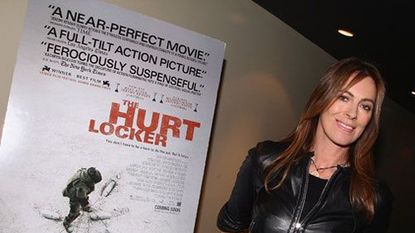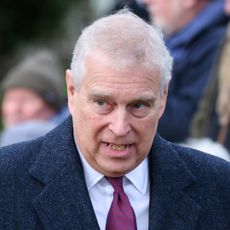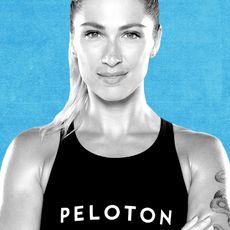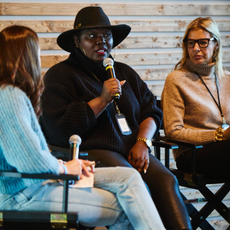Think Your Job's Hard? Read This.
Oscar-winning director Kathryn Bigelow describes the heroic bomb squad at the heart of her film The Hurt Locker.

What's the toughest gig in the world? It has to be dismantling roadside bombs, before they blow up in your face. In her new nail-biter of a feature film, The Hurt Locker, director Kathyrn Bigelow tells the story of the heroic American soldiers who spend their days sneaking up on enemy bombs in Iraq, then disassembling them with their own hands. We asked Bigelow, director of ass-kicking action films like Point Break, Blue Steel, and Strange Days, what drew her to the bomb squad.
Q. Your films have run the gamut from bloody crime dramas to sci-fi thrillers. This film is more about psychological than physical action. What sparked this idea?
A. The screenwriter, Mark Boal, had been embedded with a bomb unit in Iraq as a journalist, and I was fascinated by his stories—by the idea that the bomb technicians are walking toward what everybody else is running away from. It's kind of an epic, lonely walk that only the man in the bomb suit performs. And he does it as many as 15 times a day. I wanted to do a character study of someone who volunteers for a job like that.
Q. Where does the film get its name?
A. The Army guys speak of explosions as putting you in "the hurt locker."
Q. You filmed in Jordan, near the Iraq border, in 120-degree heat. Sounds like hell...
A. Well, it certainly was prohibitively hot! But it was a kind of profound experience. I suppose we all sort of collectively swung for the fences. I had an incredibly dedicated cast of emerging talent and some seasoned pros, along with real Iraqi extras. It required extraordinary commitment on everyone's part—especially Jeremy Renner, who had to wear a real bomb suit that weighed anywhere from 80 to 100 pounds.
Stay In The Know
Get exclusive access to fashion and beauty trends, hot-off-the-press celebrity news, and more.
Q. A French friend who saw the film with me claimed it was "too American." In other words, the Americans looked good and the Iraqis, bad...
A. I like to think of the film at its best as reportorial, and that it's not there to judge. That's not my position. I tried to give a perspective—honest, accurate, and authentic.
Q. The characters in your movies tend to be pretty macho—bank robbers, surfer studs, cops, vampires—now bomb defusers. What gives?
A. I choose material instinctually—at the heart of it are characters that I feel are fresh and original, and allow for an opportunity to, I suppose, explore uncharted ground...
Q. Are you macho?
A. [Laughs] No, I actually started out as a painter; I was involved in the art world and eventually began to look at films as an artistic medium, as a canvas.
Q. What message do you hope your new film gets across?
A. These men are sort of the unsung heroes—they're highly underappreciated. What they do is key to this particular conflict, and I think it's an element of the military that the public knows fairly little about. I wanted to identify the price of their heroism—there is a cost to the courage. The job comes with a tremendous sense of purpose, but it almost ruins these guys for normal life.
Q. Yet the film suggests they enjoy it.
A. There's a book by Chris Hedges called War Is a Force That Gives Us Meaning, and it opens with a quote that says, essentially, war is a drug. I wanted to explore that idea, the notion that war's dirty little secret is that men like it.
Abigail Pesta is an award-winning investigative journalist who writes for major publications around the world. She is the author of The Girls: An All-American Town, a Predatory Doctor, and the Untold Story of the Gymnasts Who Brought Him Down.
-
 Prince Andrew's Business Advisor Accused of Being a "Spy" and Banned From the U.K.
Prince Andrew's Business Advisor Accused of Being a "Spy" and Banned From the U.K."We found a way to get the relevant people unnoticed in and out of the house in Windsor."
By Amy Mackelden Published
-
 Kate Middleton Allegedly Rejected Idea to Seat Prince Andrew "Behind a Pillar" at Her Christmas Carol Concert
Kate Middleton Allegedly Rejected Idea to Seat Prince Andrew "Behind a Pillar" at Her Christmas Carol Concert"Although very much a family affair... there was no space for Uncle Andy."
By Amy Mackelden Published
-
 32 Celebrities Who Got Their Start on Reality TV
32 Celebrities Who Got Their Start on Reality TVBelieve it or not.
By Iris Goldsztajn Published
-
 Peloton’s Selena Samuela on Turning Tragedy Into Strength
Peloton’s Selena Samuela on Turning Tragedy Into StrengthBefore becoming a powerhouse cycling instructor, Selena Samuela was an immigrant trying to adjust to new environments and new versions of herself.
By Emily Tisch Sussman Published
-
 This Mutual Fund Firm Is Helping to Create a More Sustainable Future
This Mutual Fund Firm Is Helping to Create a More Sustainable FutureAmy Domini and her firm, Domini Impact Investments LLC, are inspiring a greater and greener world—one investor at a time.
By Sponsored Published
-
 Power Players Build on Success
Power Players Build on Success"The New Normal" left some brands stronger than ever. We asked then what lies ahead.
By Maria Ricapito Published
-
 Don't Stress! You Can Get in Good Shape Money-wise
Don't Stress! You Can Get in Good Shape Money-wiseYes, maybe you eat paleo and have mastered crow pose, but do you practice financial wellness?
By Sallie Krawcheck Published
-
 The Book Club Revolution
The Book Club RevolutionLots of women are voracious readers. Other women are capitalizing on that.
By Lily Herman Published
-
 The Future of Women and Work
The Future of Women and WorkThe pandemic has completely upended how we do our jobs. This is Marie Claire's guide to navigating your career in a COVID-19 world.
By Megan DiTrolio Published
-
 Black-Owned Coworking Spaces Are Providing a Safe Haven for POC
Black-Owned Coworking Spaces Are Providing a Safe Haven for POCFor people of color, many of whom prefer to WFH, inclusive coworking spaces don't just offer a place to work—they cultivate community.
By Megan DiTrolio Published
-
 Where Did All My Work Friends Go?
Where Did All My Work Friends Go?The pandemic has forced our work friendships to evolve. Will they ever be the same?
By Rachel Epstein Published